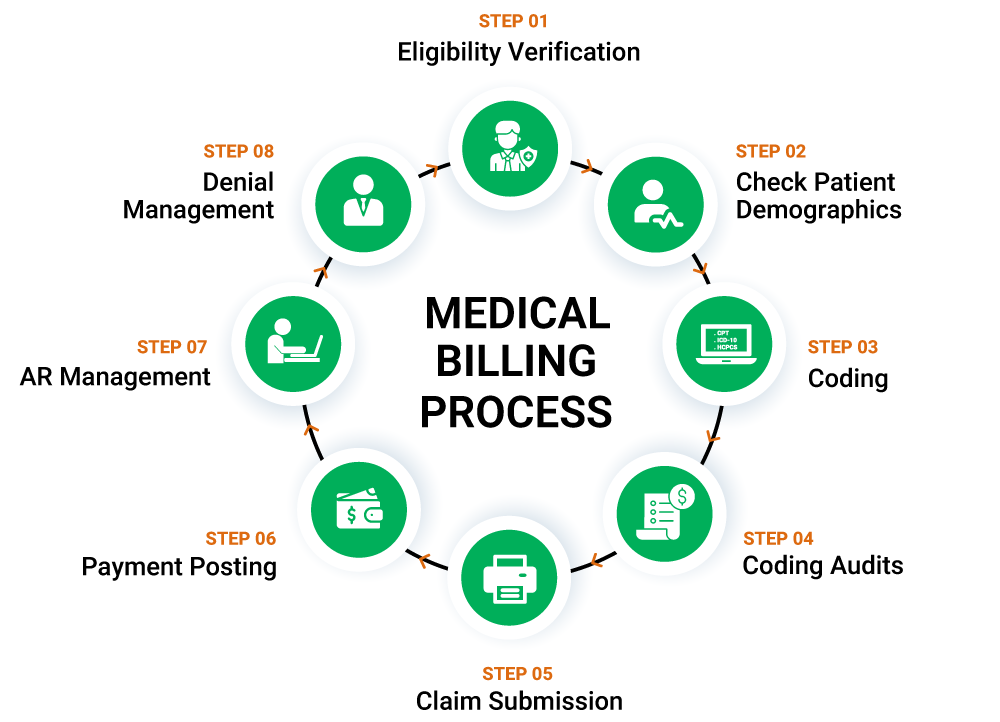Outsourcing medical billing services has become an increasingly popular option for healthcare providers looking to streamline their revenue cycle management and focus more on patient care. This practice involves hiring third-party companies specialized in handling billing and coding tasks, allowing healthcare providers to delegate administrative burdens and ensure accurate and timely reimbursement. Here’s a detailed look at the benefits and considerations associated with outsourcing medical billing services:

Benefits:
- Expertise and Efficiency: Medical billing companies employ trained professionals with expertise in coding, billing regulations, and insurance claims processing. By outsourcing these tasks, healthcare providers can leverage the specialized skills of these professionals, leading to more accurate coding, faster claim submissions, and reduced billing errors.
- Cost Savings: Outsourcing medical billing services can result in significant cost savings for healthcare providers. Instead of hiring and training in-house billing staff, providers can pay for services on a per-claim basis or through a fixed fee arrangement. Additionally, outsourcing eliminates the need for investing in billing software, infrastructure, and ongoing maintenance costs.
- Improved Revenue Cycle Management: Outsourcing medical billing can streamline the revenue cycle management process, from patient registration to claim submission and payment posting. Experienced billing companies employ efficient workflows and technology solutions to expedite the reimbursement process, leading to faster payments and improved cash flow.
- Focus on Patient Care: By outsourcing billing tasks, healthcare providers can redirect their focus and resources towards delivering quality patient care. With administrative burdens lifted, clinicians and staff can devote more time to patient consultations, treatment, and other essential aspects of healthcare delivery.
- Scalability and Flexibility: Outsourcing medical billing services offers scalability and flexibility to accommodate fluctuations in patient volume and billing complexity. Providers can easily scale up or down their billing services based on their needs, without the hassle of hiring or laying off staff.
Considerations:
- Data Security and Compliance: When outsourcing medical billing services, healthcare providers must ensure that the billing company adheres to strict data security standards and complies with healthcare regulations such as HIPAA (Health Insurance Portability and Accountability Act). It’s essential to choose a reputable billing partner with robust security measures in place to protect sensitive patient information.
- Communication and Transparency: Effective communication and transparency are crucial for a successful outsourcing partnership. Healthcare providers should establish clear lines of communication with their billing company to stay informed about billing processes, claim status, and financial performance. Regular reporting and feedback mechanisms can help foster trust and accountability between the provider and the billing service.
- Quality Assurance: While outsourcing can improve billing accuracy and efficiency, providers must maintain oversight and quality assurance measures to ensure compliance with coding guidelines and payer requirements. Periodic audits and performance evaluations can help identify areas for improvement and ensure that billing processes align with industry standards.
- Service Level Agreements (SLAs) and Contracts: Healthcare providers should carefully review service level agreements (SLAs) and contracts before entering into an outsourcing arrangement. Key considerations include pricing structure, turnaround times, dispute resolution mechanisms, and termination clauses. Clear contractual terms help mitigate risks and establish expectations for both parties involved.






